Grand Lodge History (1880 – 1900)
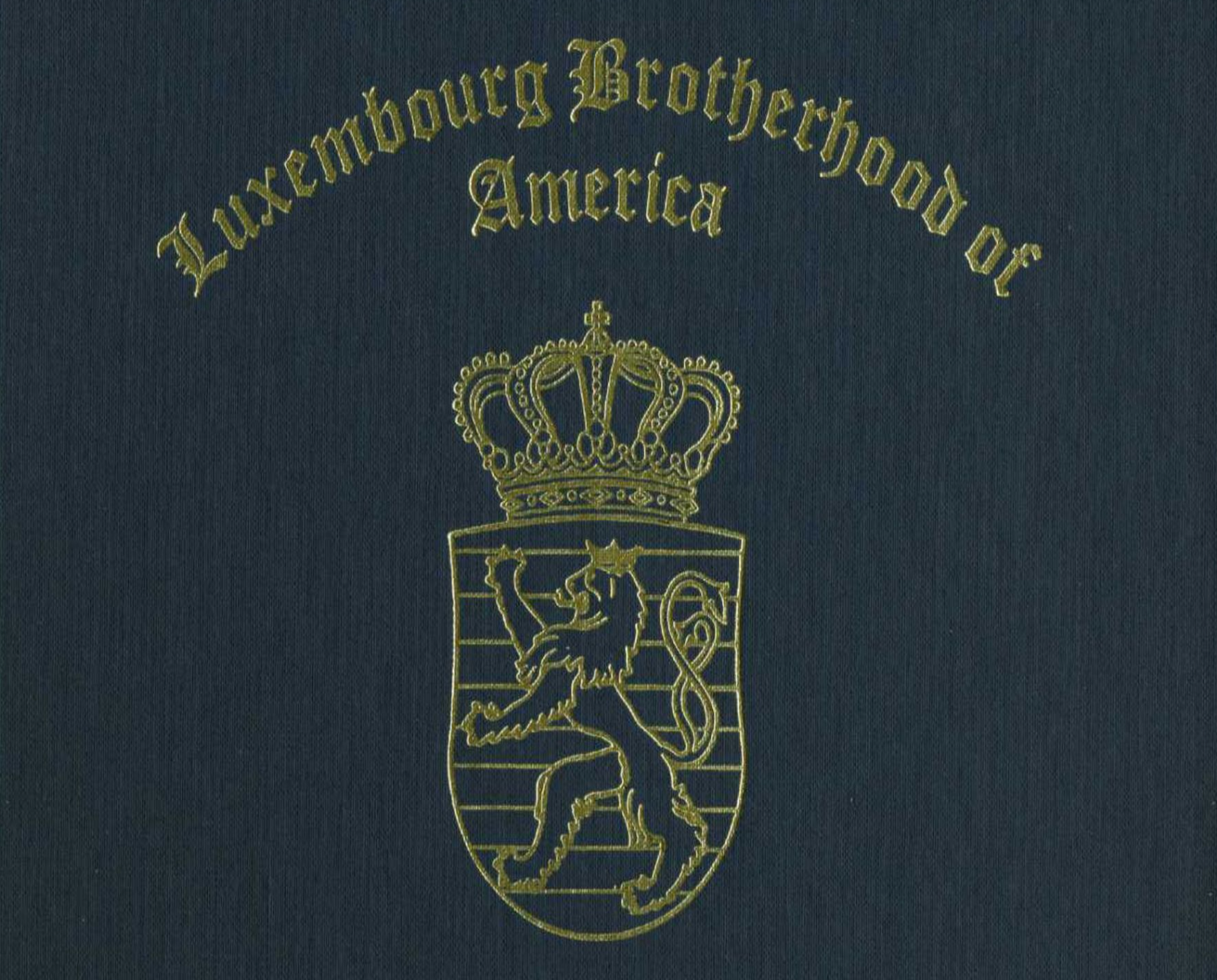
1880 – 1900
The genesis of any ethnic organization is rooted in the desires of its members to revive, in a new setting, fading memories of old lands, customs, and traditions. The catalyst for banding together was the strangeness of their new world with its new language, customs, and traditions. The Luxembourg immigrants to America were no different than those who came before them and those who would come after them. America required that the disparate Luxembourg settlements, then located in Port Washington, Dubuque, Remsen, Escanaba, Rollingstone, New York, and Chicago come together periodically to share their heritage. It was a tremendous undertaking for an immigrant family to establish itself in a new home, find jobs and become a part of its new community. Many of the people were not familiar with the English language and it was important that the newcomers find aid and comfort in meeting with people from their native Luxembourg.
In the 1880s several Luxembourg clubs were started in different American cities. Some of these so-called “Luxembourg Benefit Societies” were established in Williamsburg, NY, Chicago, IL, St. Paul, MN and Dubuque, IA. One of the purposes of these clubs was to start a death benefit fund, which would be payable to the surviving spouse. However, because sound insurance mortality tables were not available, the death benefit funds became depleted, and the societies eventually dissolved.
The Luxembourg Brotherhood of America was not the first Chicago organization of Luxembourgers. In 1885, the Luxembourg Independent Club was organized and its membership
was open to all Luxembourg immigrants in Chicago and its suburbs. The meetings were well attended, but the way in which those meetings were conducted would give rise to the organization whose centennial we celebrate.
A dispute arose between those who favored meetings conducted in accordance with the rules of parliamentary procedure and those who favored a more relaxed meeting. Those who favored the latter were the newest immigrants whose exposure to strict adherence to rules and procedures was truly alien. Disagreements arose between these factions and those who favored a more relaxed approach held a meeting in the tavern of John Hankes, located at Halsted St. near Archer Avenue, for a discussion of their grievances.
Present at that meeting were: Michael Unsen, Nick Stirn, Bernard Dieschbourg, John Schmit (from Kehlen, Luxembourg), Bernard Molitor (from Neumuehle, Luxembourg), Nick Manderscheid, Charles Puetz, and Nick Mersch (from Bauschleiden. Luxembourg). Mersch suggested that they organize a new Luxembourg club for those people living on the south side of Chicago. All present agreed to form a new club and John Hanks (from Schieren, Luxembourg) donated $1.50 to buy the postal cards which were used to notify the Luxembourgers living on the South side of its formation.
The invitations were issued, and on October 23, 1887, an organization meeting was held with John Schmit presiding. On that day, the club was organized, and the following officers were elected for the balance of the year:
President John Schmit
Vice President Nick Stirn
Secretary Nick Mersch
Treasurer Michael Unsen
Present at the meeting were 25 men who paid the 25 cents initiation fee and joined the club. The treasury now had a fund of $6.25. A committee consisting of Bernard Dieschbourg, John Diederich, and John Hankes was appointed to draft a constitution. Orders were issued to announce the formation of the new club in the “Staatszeitung” and in the “Arbeiterzeitung” newspapers. A meeting was held on November 6, 1887. At this meeting, additional time was given to the constitutional committee, and Nick Cigrang, Edward Turmes (from Hosingen, Luxembourg), and John Schmit were added to it. At the third meeting, held on Christmas Day, 1887, the Constitution Committee gave the society its official name, “Luxembourg Bruderbund.’ After the adoption of the Constitution, the following officers were elected:
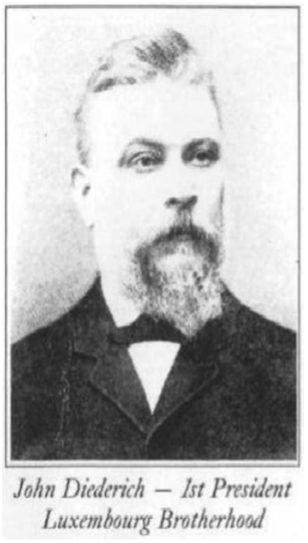 President John Diederich
President John Diederich
Vice President John Schmit
Recording Secretary Nick Mersch
Financial Secretary Nick Cigrang
Treasurer Bernard Dieschbourg
Trustee Nick Stirn
Trustee John Hankes
Trustee Peter Hubing
The new organization’s first social gathering was a dance, held in January 1888. A profit of $36.25 was earned, and the addition of several dues-paying members swelled the balance in the Treasury to $103.45. By February 1888, the Luxembourg Bruderbund consisted of 28 members.
They were:
Jacob Alken Nick Feiereisen Nick Mersch John Schmit
Nick Bonert Nickolas Habig J.P. Mootz Nick Stirn
Nick Cigrang John Hankes W. Paultz H.E. Stirn
John Diederich Valentine Hankes John Schaak Edward Turmes
Bernard Dieschbourg Nick Hansen Math Schils Michael Unsen
J.B. Erpelding Peter Hubing John Schimberg Nickolas Weber
Henry Feiereisen Peter Lenz Henry Schmalen Gustave Witwar
In the Spring of 1888, the officers of the Bruderbund offered to host a joint picnic with the Luxembourg Independent Club which offer was rebuffed. An outing to Cedar Lake, Indiana was organized and was successful. The new Luxembourg organization had succeeded in overcoming the ridicule of the older Independent Club and had hosted two successful enterprises, The Bruderbund was here to stay.
In the fall of 1888, in order to encourage new members to join, and to provide for a member’s family upon his death, the officers applied for and received a certificate of incorporation from the State of Illinois. Dated December 8, 1888, the charter reveals that the object of incorporation was to encourage “benevolence, charity, and social ability.” The first three directors of the newly organized Luxembourger Bruderbund were Nicholas Stirn, Peter Hubing, and John Hankes. The incorporators were John Diederich, Henry E. Stirn, Mathias Schils, and Michael Lorang. By the end of December 1888, the following additional members had joined:
Peter Girten. Jacob Mathey Henry Reiff George Trierweiler
Jacques Hilger Nickolas Michels Pete Scholler Nick Wagner
J.M. Lauf Bernard Molitor W. Spanier Thomas Wagner
Nick Ludwig Charles Puetz Math Toekes Anton Wark
Nick Manderscheid
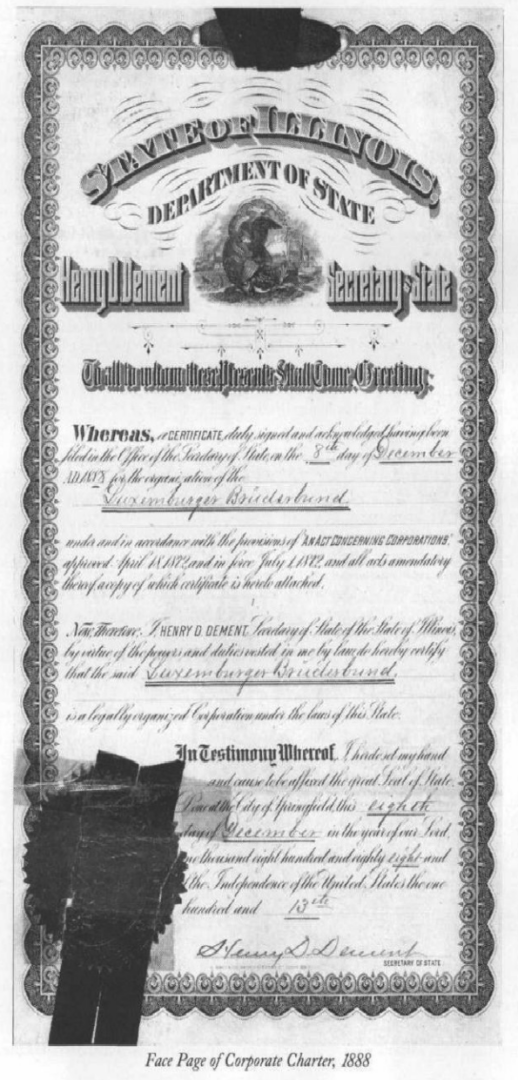
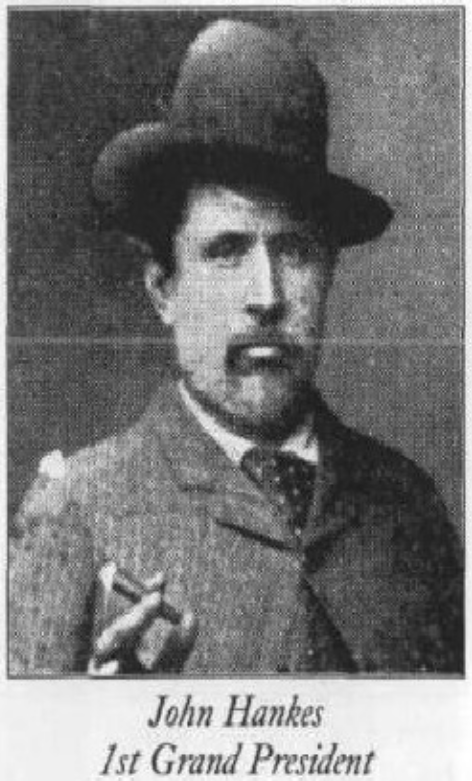 News of the growing Bruderbund spread to other Luxembourg settlements in the Midwest. In 1893, during the course of Chicago’s World Fair, the Luxembourg Independent Club issued an invitation to all Luxembourg organizations in the United States to meet in Chicago on October 23, 1893, at Brand’s Hall. Delegates were present from Dubuque, Winona, St. Paul, Shakopee, Lacrosse, Milwaukee, and Detroit. John Ludwig from Winona, MN. was the presiding officer, and Nick Gonner from Dubuque was the secretary.
News of the growing Bruderbund spread to other Luxembourg settlements in the Midwest. In 1893, during the course of Chicago’s World Fair, the Luxembourg Independent Club issued an invitation to all Luxembourg organizations in the United States to meet in Chicago on October 23, 1893, at Brand’s Hall. Delegates were present from Dubuque, Winona, St. Paul, Shakopee, Lacrosse, Milwaukee, and Detroit. John Ludwig from Winona, MN. was the presiding officer, and Nick Gonner from Dubuque was the secretary.
The purpose of the convention was to establish an umbrella organization whose mission would be to preserve the ideals, characteristics, and traits of the Luxembourg immigrants in America and, secondarily, to establish a benefit association open to all Luxembourgers irrespective of geographic location. A tentative Constitution was adopted, and further substantive proceedings were deferred until the Second Congress, which convened in St Paul in 1894.
A parade preceded the solemn church services. The meeting did not accomplish a great deal, so it was decided to try again the following year. In 1895, a third Congress was convened in Dubuque. Delegates fron1 the Luxembourg Independent Club of St. Paul, Luxembourg Brotherhood of St. Paul, Luxembourg National Society of Minnesota, Luxembourg Benefit Society of Shakopee, Luxembourg Society of Winona, Luxembourg Nickolas Society of Rollingstone, Luxembourg Sick Benefit Society of Dubuque, Luxembourg Independent Club of Aurora, Luxembourg Independent Club of Chicago and the Bruderbund attended.
As the tentative constitution had been scrapped in St. Paul, a new constitution was adopted, and the name “Luxembourg Nationalverein” was given to the new organization. To meet death benefit payments, an assessment on the affiliated societies was proposed. Due to the lack of a favorable response to this proposal, the National Society came to a quick end. Attempts were made in 1896, and again in 1897, to revive the Nationalverein, but these efforts failed. In the ensuing ten-year period, numerous efforts to revive the concept of an umbrella organization were initiated, but came to no avail, principally due to disagreements arising out of the proper role of religion and political affiliation.
From 1888 to 1896, the Bruderbund prospered and grew rapidly. It now had 75 members including John N. Watry, who suggested that L.B.A. branch out and form new clubs in other Luxembourg settlements. Frank Dieschbourg is given credit for suggesting that the new branches be known as ‘Sections’.
In Chicago, near the steel mills, a large number of Luxembourgers settled. It became apparent that a local society could be established in the area. They had heard glowing reports of the Bruderbund and decided they would like to become part of the organization. A committee composed of John N. Watry, John Schmit, Nick Stirn, and Frank Dieschbourg was appointed to draft an amendment to the constitution that would permit the affiliation of ‘branches’ into the Brotherhood.
A meeting was called on the South side of Chicago and after deliberation, it was decided to organize another branch of the L.B.A., and that it would be designated as ‘Section 2’. It now became necessary to form a head organization, and the first Grand Lodge meeting was held on February 14, 1897. At this meeting, the organization of the Grand Lodge was established, and the following members were elected as the first Grand Lodge officers:
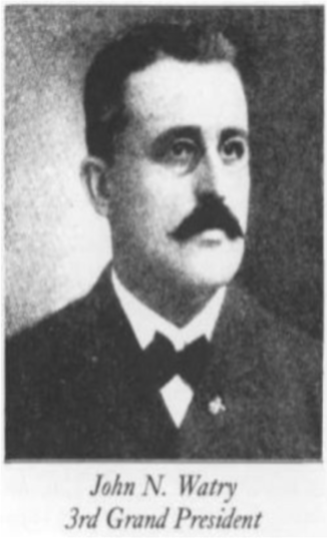 Grand President John Hankes
Grand President John Hankes
Grand Vice President Nick Mausen
Grand Secretary John N. Watry
Grand Treasurer Nick Stirn
Grand Trustee John Diederich
Grand Trustee John Schmit
Grand Trustee Mathias Berchem
In April 1897, John Glesener, a member of Section 1, then living in Rogers Park, formed Section 3. On May 9, 1897, Section 3 was welcomed into the Bruderbund. In May 1897, the 5th Luxembourg Congress 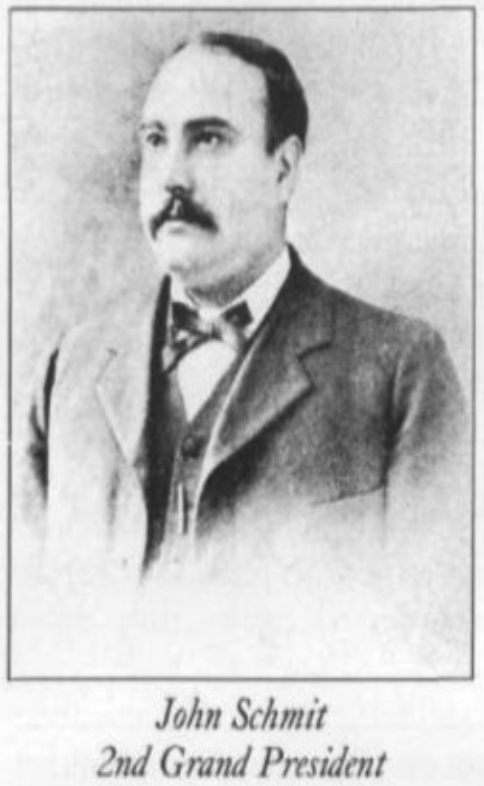 was convened at Turner Hall on Chicago’s northside. With the addition of Section 3, the newly invigorated L.B.A. extended an invitation to the other Luxembourg organization to join it, which invitation was again rebuffed. The effort to link all Luxembourg organizations into one umbrella group was now dead. From this point, they would go their separate ways.
was convened at Turner Hall on Chicago’s northside. With the addition of Section 3, the newly invigorated L.B.A. extended an invitation to the other Luxembourg organization to join it, which invitation was again rebuffed. The effort to link all Luxembourg organizations into one umbrella group was now dead. From this point, they would go their separate ways.
In l898 and 1899, the Grand Lodge met to review the affairs of the previous years and to discuss the future. At the 1899 Grand Lodge meeting, John Schmitt was elected as Grand President succeeding John Hankes. Nicholas Nilles was elected to succeed John N. Watry as Grand Secretary, a post he would hold until 1949. The insurance laws of Illinois required insurance organizations to have at least 500 insured members. In order to qualify for a state insurance charter, a membership drive was initiated.
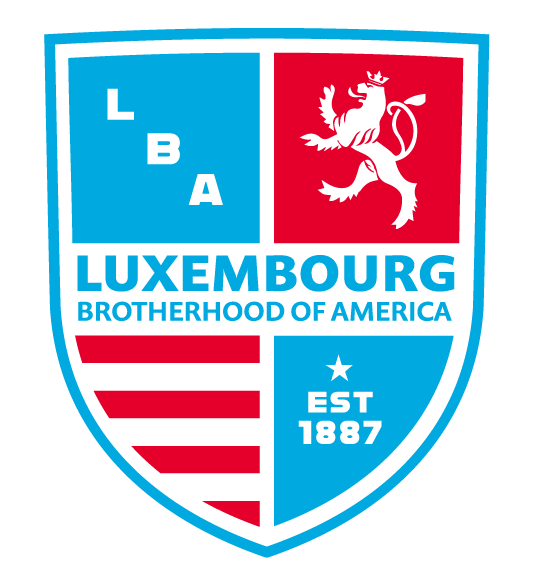
Recent Comments